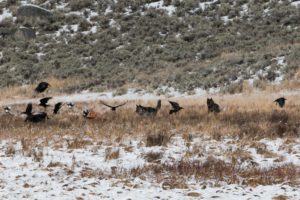Wednesday April 14, 2021 7:30 pm Eastern Time (US and Canada) Zoom Program
Join the New Hampshire Audubon Seacoast Chapter for their April program: Ravens, Wolves and People.

Common ravens are known to scavenge from wolves and people, but the degree to which they exploit these and other sources of food has not been studied in detail. In 2019, Matthias Loretto and presenter John Marzluff began tagging ravens in Yellowstone National Park with long-lasting GSM transmitters. After tagging >60 ravens and relating their movements to those of people and wolves, they are gaining an appreciation of the raven’s reliance on both providers. John will describe the movements of territorial and non-breeding ravens and relate these to wolf- and human-provisioned foods. He will focus on the exploits of individual birds to emphasize variability. They observed ravens using wolf kills, but the ravens’ discovery appears more incidental than a result of following or purposeful search. As they begin to quantify the relationship between wolves and ravens, they may learn more about raven and wolf synchrony, but at present, it appears to be weak, with discovery of kills occurring during the day rather than after communal roosting. Ravens made extensive use of anthropogenic resources, including direct handouts, wastewater treatment ponds, dumps, agriculture, roadkills, and hunter offal. Territorial ravens have extensive knowledge of the Greater Yellowstone Ecosystem and exploit areas in excess of 6500 square miles to obtain their yearly needs.
John Marzluff is James W. Ridgeway Professor of Wildlife Science at the University of Washington. His graduate (Northern Arizona University) and initial post-doctoral (University of Vermont) research focused on the social behavior and ecology of jays and ravens. He continues this theme investigating the intriguing behavior of crows, ravens, and jays. His current research focuses on the interactions of ravens and wolves in Yellowstone. He teaches Ornithology, Governance and Conservation of Rare Species, Field Research in Yellowstone, and Natural and Cultural History of Costa Rica.
Professor Marzluff has written five books and edited several others. His Welcome to Subirdia (2014 Yale) discovers that moderately settled lands host a splendid array of biological diversity and suggests ways in which people can steward these riches to benefit birds and themselves. His most recent book, In Search of Meadowlarks (2020 Yale) connects our agriculture and diets to the conservation of birds and other wildlife.
Dr. Marzluff has mentored over 40 graduate students and authored over 140 scientific papers on various aspects of bird behavior and wildlife management. He is a member of the US Fish and Wildlife Service’s Recovery Team for the critically endangered Mariana Crow, a former member of the Washington Biodiversity Council, a Fellow of the American Ornithologist’s Union, and a National Geographic Explorer.
All are welcome to attend our Wednesday April 14, 2021 program via Zoom. The Zoom program Meeting begins at 7:30pm, but feel free to sign on early after 7pm to socialize. You may need to download Zoom (https://zoom.us/download) to attend the program.
Please register in advance for this meeting. You can register right up through the start time:
https://unh.zoom.us/meeting/register/tJUofuGtqjwjH9GmEQj_YML95AjhNMqqpsaw
After registering, you will receive a confirmation email containing information about joining the meeting.
For more information see our web site at http://www.seacoastchapter.org/programs. Cancellations will be announced on http://www.seacoastchapter.org/programs.


